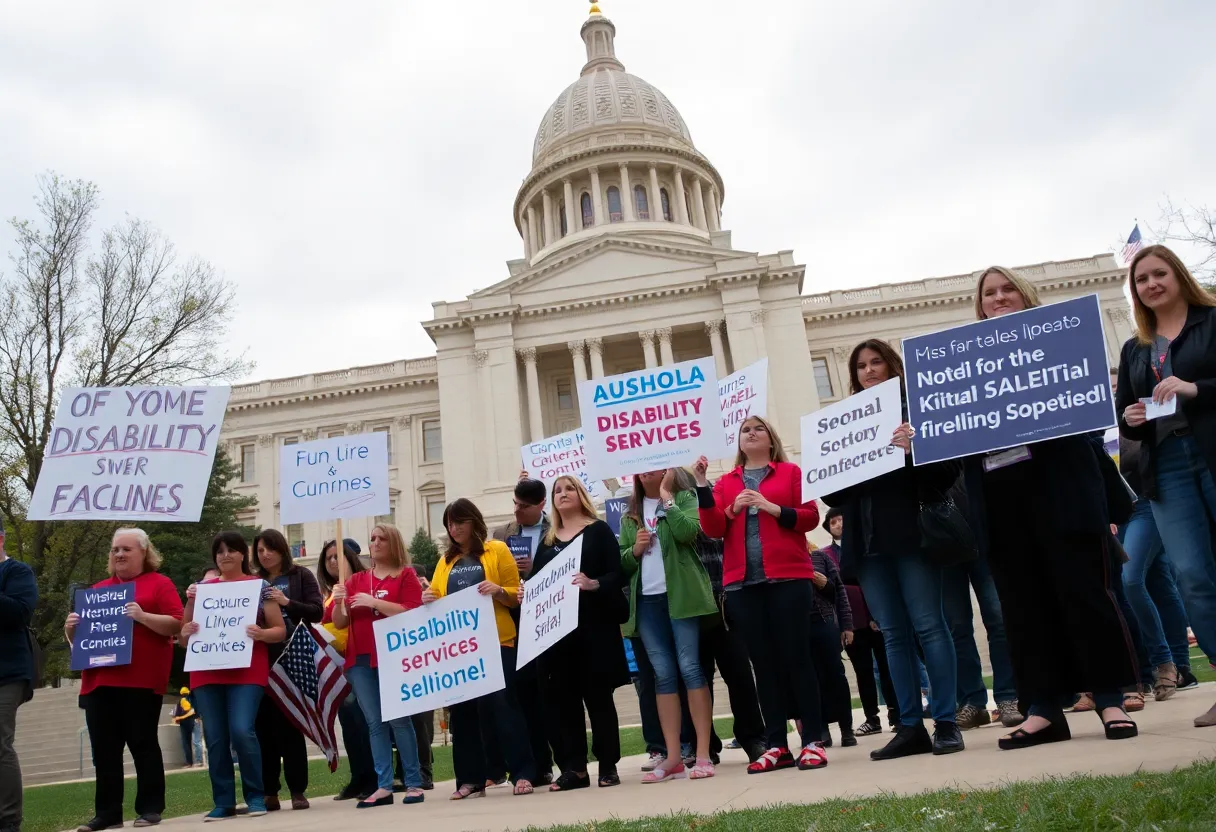News Summary
Arizona is grappling with sweeping changes to its disability services, with new care restrictions threatening vital support for families relying on state aid. Advocates warn that these changes could disrupt the lives of approximately 65,000 individuals with disabilities, forcing families into financial turmoil. Upcoming limitations on the Parents as Paid Caregivers Program are poised to exacerbate the crisis, leaving many families anxious about their futures and access to essential care services.
Arizona is facing significant upheaval in its disability services as new care restrictions threaten essential support for families reliant on state aid. Advocates for Arizona’s developmentally disabled community have expressed deep concerns about the impending changes, citing exhaustion and fears of financial ruin due to the new limitations on state program coverages.
In a demonstration held at the Arizona Capitol on February 26, Kathleen Muldoon, a parent dependent on the Division of Disability Services for care, joined other advocates in urging lawmakers to reconsider the changes which have the potential to disrupt the lives of approximately 65,000 Arizonans with disabilities. This community previously benefited from $122 million in supplemental funding secured less than six months ago to avert a financial crisis for the Division of Developmental Disabilities (DDD).
The supplemental funding was primarily agreed upon by Republican lawmakers, who imposed “guardrails” to manage expenditures associated with the Parents as Paid Caregivers Program (PPCG). This program was crucial for families providing in-home care for children with disabilities that demand extraordinary support. Unfortunately, participation in the PPCG nearly doubled from 3,000 to around 6,000 families, leading to unsustainable cost increases.
Originally funded through federal resources during the COVID-19 pandemic, the PPCG is now placing additional financial burden on the state, which must cover approximately 35% of the program’s costs as the temporary measure received permanent approval earlier this year. House Bill 2945 was enacted in April with bipartisan support to introduce new limits for the PPCG program, aiming to control these soaring costs.
New implementation rules for the PPCG are set to come into effect on October 1, 2025, introduced by the Arizona Healthcare Cost Containment System (AHCCCS) and published for public comment in May. However, many parents were largely unaware of critical age-related service restrictions until a public forum on September 4. These new rules stipulate that reimbursement will not be provided for specific assistance programs, including:
- No payments for toileting assistance for children under six years old.
- No payments for bathing assistance for children under eight years old.
- Limited payment for supervision services for children under ten years old.
Families are now in an alarming position, feeling threatened by potential homelessness due to these restricted services. This situation has led to heightened panic and unnecessary scrambling as parents search for alternative care solutions to support their children. Observers have noted that these changes disproportionately affect families residing in rural areas where specialized care services are scarce, further exacerbating the crisis for those in need of assistance.
Moreover, additional limitations are set to be imposed on habilitation care. Children under two years old will not have access to these services, and those aged three to five will be capped at only five hours per week. Advocates are anticipating substantial funding reductions as the state braces for staggering cuts in Medicaid support, with projected losses totaling around $34 billion over the next decade.
Many parents are expressing dissatisfaction regarding the perceived lack of transparency in the decision-making process that led to these restrictive measures. Numerous families feel blindsided, noting that significant components of the new policies were not clearly delineated in previously released documents.
In response to these developments, Governor Hobbs and her administration have been actively involved in negotiations over funding conditions. While emphatically asserting that Arizona’s disability services remain among the most comprehensive in the nation, they defend the measures in light of the state’s challenging budget constraints.
This evolving scenario underscores the complexities surrounding funding for disability services in Arizona, reflecting the urgent need for clear communication between state officials and families affected by these changes.
Deeper Dive: News & Info About This Topic
- Arizona Mirror: Families Fear Financial Ruin
- Tucson Sentinel: Opinion on Disabled Kids
- ABC15: Arizona House Passes Bipartisan Fix
- AZFamily: Arizona House Passes Bill for Disability Programs
- Encyclopedia Britannica: Disability Services Arizona

Author: STAFF HERE PHOENIX WRITER
The PHOENIX STAFF WRITER represents the experienced team at HEREPhoenix.com, your go-to source for actionable local news and information in Phoenix, Maricopa County, and beyond. Specializing in "news you can use," we cover essential topics like product reviews for personal and business needs, local business directories, politics, real estate trends, neighborhood insights, and state news affecting the area—with deep expertise drawn from years of dedicated reporting and strong community input, including local press releases and business updates. We deliver top reporting on high-value events such as the Waste Management Phoenix Open, Cactus League Spring Training, and Arizona State Fair. Our coverage extends to key organizations like the Greater Phoenix Chamber of Commerce and Visit Phoenix, plus leading businesses in technology and healthcare that power the local economy such as Intel and Banner Health. As part of the broader HERE network, including HERETucson.com, we provide comprehensive, credible insights into Arizona's dynamic landscape.





